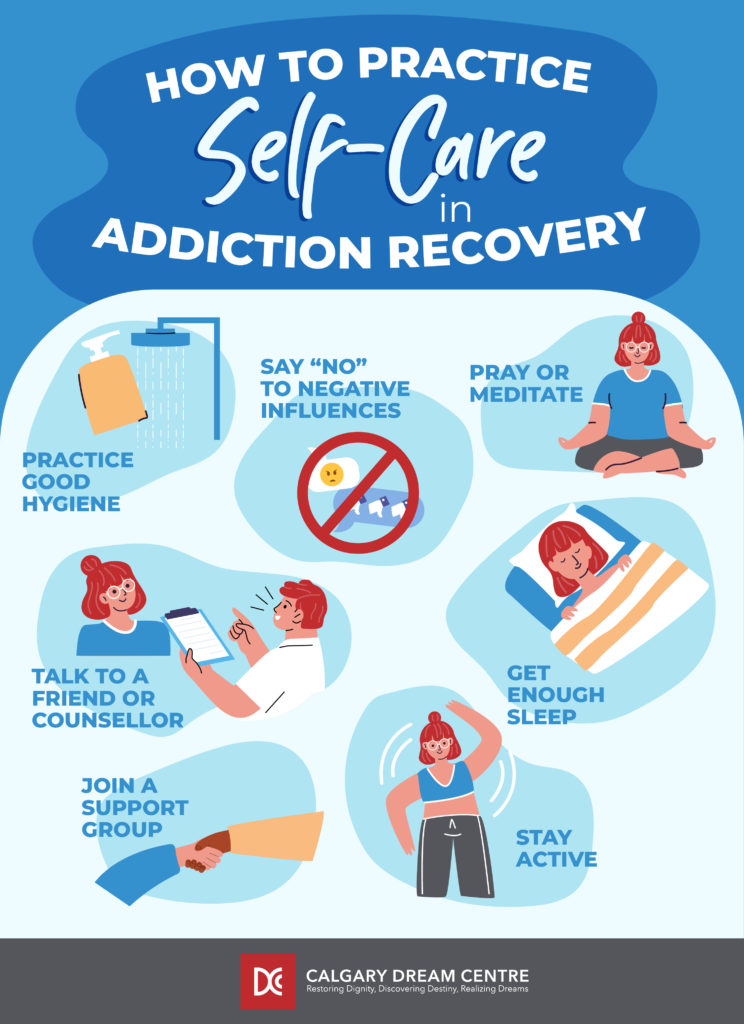The journey to recovery can be difficult, and there will likely be challenges along the way. When dealing with any kind of illness, including drug or alcohol addiction, self-care is an essential element of the recovery process. Just like our bodies require healthy food, hydration, and exercise to thrive, our minds require attention and care to function at their best.
Taking care of yourself is not only a vital part of maintaining sobriety, but it’s also a crucial element in overall well-being. Addressing physical, mental, and spiritual needs can equip you with the necessary tools to resist triggers that could potentially jeopardize your sobriety.
In addiction recovery, practicing self-care can help with:
- Mental health
- Reducing stress & anxiety
- Reducing reliance on substance use
- Improving social well-being
How Self-Care Can Help You in Addiction Recovery
Self-care isn’t just about bubble baths and relaxation—it means taking care of ourselves from the inside out and caring for our physical, mental, emotional, and spiritual needs.
In the context of addiction recovery, self-care becomes even more important. Addiction can throw life out of balance, and self-care can help restore that balance by encouraging you to prioritize your needs and well-being. Regular exercise, a balanced diet, and adequate sleep are all forms of self-care that help your body heal and regain strength.
By taking care of yourself, you’re also reinforcing the belief that you’re worth recovery. This can help build resilience, boost your self-esteem, make it easier to resist cravings or triggers, and potentially reduce the risk of relapse.
Mental Health
Self-care can be a way of telling yourself, “I matter.” That’s a powerful message that can be used to combat negative self-talk, which often goes hand in hand with addiction. Self-care activities like meditation or journaling can help you process your emotions and deal with stressful situations.
Seeking help from a therapist or counsellor can also be a method of self-care, as taking steps to cope with your mental health struggles is an act of self-love.
Reducing Stress & Anxiety
Stress is a significant risk factor for developing a substance use disorder. Self-care habits can reduce the impact of stress on your daily life, which may help curb the urge to use substances to cope.
Physical self-care can be incredibly beneficial in this area. Regular physical activity releases endorphins, your body’s feel-good hormones, which act as natural painkillers and mood elevators. Plus, focusing on your body’s movements can help shift your attention from your daily worries and stress.
Reducing Reliance on Substance Use
The cycle of addiction can leave you feeling physically drained and mentally exhausted. By practicing physical self-care, you’re taking care of your body and also nurturing your mind and spirit. Physical care can bolster your mental resilience, helping you resist cravings and supporting your journey toward recovery.
Improving Social Well-Being
Social interactions can boost your mood, reduce feelings of isolation, and create a sense of belonging. Making an effort to socialize and be around others is a great way to practice self-care and build a supportive social network. Surrounding yourself with positive influences can help you stand up to triggers that could threaten your sobriety.

How Do I Make Self-Care a Priority in Recovery?
Much like addiction recovery, self-care is a continuous process that requires effort. It can take many forms, from physical care habits to finding healthy ways to feel your emotions. There are several ways you can make self-care a priority on your recovery journey.
Care for Your Physical Health
- Practice good hygiene
- Eat healthy meals
- Focus on getting adequate sleep
- Incorporate physical activity into your daily routine
Set Healthy Boundaries
- Practice saying “no” to things that don’t align with your values
- Distance yourself from people and activities that threaten your sobriety
- Set time aside for yourself
Nurture Your Spirituality
- Meditate
- Pray
- Join a spiritual community
- Spend time in nature
Process Negative Emotions
- Talk to a trusted friend
- Join a support group
- Speak to a counsellor or therapist
- Write down your feelings in a journal
Self-Compassion & Addiction Recovery
Self-compassion is another important part of recovery that, when embraced, can truly make a difference in your journey.
Treat yourself with the same kindness and understanding you’d offer a friend who’s struggling. You’re human, and it’s okay to make mistakes. Recognizing this doesn’t mean you’re condoning negative behaviour; it means you’re acknowledging your imperfections as part of the human experience.
Self-compassion may also help you counteract feelings of shame or self-criticism that often accompany substance abuse. Recovery isn’t always a straight path—there might be bumps along the way. Self-compassion allows you to pick yourself up, learn from the experience, and continue on your journey.

Social Support & Self-Care Resources at Calgary Dream Centre
The road to recovery isn’t a journey you have to make alone. In fact, you shouldn’t. That’s where social support and self-care resources come in.
At Calgary Dream Centre, we offer addiction recovery programs, social support, and other resources to help you on the road to recovery. Our programs aim to nurture your mind, body, and spirit, helping you develop and maintain self-care habits that can benefit you throughout your life.
Reach out to us today to learn how we can help—we’re here to listen without judgment.



